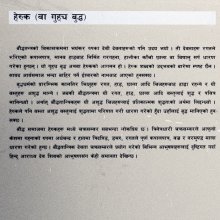Ashuddha, Aśuddha, Asuddha: 14 definitions
Introduction:
Ashuddha means something in Hinduism, Sanskrit, Buddhism, Pali, Marathi, Jainism, Prakrit, Hindi. If you want to know the exact meaning, history, etymology or English translation of this term then check out the descriptions on this page. Add your comment or reference to a book if you want to contribute to this summary article.
The Sanskrit term Aśuddha can be transliterated into English as Asuddha or Ashuddha, using the IAST transliteration scheme (?).
Alternative spellings of this word include Ashuddh.
Images (photo gallery)
In Hinduism
Dharmashastra (religious law)
Source: Wisdom Library: Dharma-śāstraAśuddha (अशुद्ध) refers to the “impure”, as in, the opposite of pure (śuddha). It is used throughout Dharmaśāstra literature such as the Manusmṛti and the Baudhāyana-dharmasūtra.

Dharmashastra (धर्मशास्त्र, dharmaśāstra) contains the instructions (shastra) regarding religious conduct of livelihood (dharma), ceremonies, jurisprudence (study of law) and more. It is categorized as smriti, an important and authoritative selection of books dealing with the Hindu lifestyle.
Languages of India and abroad
Pali-English dictionary
Source: BuddhaSasana: Concise Pali-English Dictionaryasuddha : (adj.) unclean.

Pali is the language of the Tipiṭaka, which is the sacred canon of Theravāda Buddhism and contains much of the Buddha’s speech. Closeley related to Sanskrit, both languages are used interchangeably between religions.
Marathi-English dictionary
Source: DDSA: The Molesworth Marathi and English Dictionaryaśuddha (अशुद्ध).—a (S) Incorrect, inaccurate, faulty. 2 Impure, polluted, defiled. 3 Used as s n An error or blunder (in writing or speaking).
--- OR ---
aśuddha (अशुद्ध).—n (S Poetry.) Blood. Ex. tēthēñci mardilā muṣṭighātēṃ rāhu āṇi kētu || indrāpāsīṃ ālē dhāvatu || aśuddhēṃ nhālēṃ parvatu ||
Source: DDSA: The Aryabhusan school dictionary, Marathi-Englishaśuddha (अशुद्ध).—a Incorrect; impure. n An error. Blood.
Marathi is an Indo-European language having over 70 million native speakers people in (predominantly) Maharashtra India. Marathi, like many other Indo-Aryan languages, evolved from early forms of Prakrit, which itself is a subset of Sanskrit, one of the most ancient languages of the world.
Sanskrit dictionary
Source: DDSA: The practical Sanskrit-English dictionaryAśuddha (अशुद्ध).—a.
1) Impure, foul.
2) Inaccurate, incorrect, wrong.
3) Unknown, unascertained.
-ddham Blood.
Source: Cologne Digital Sanskrit Dictionaries: Shabda-Sagara Sanskrit-English DictionaryAśuddha (अशुद्ध).—mfn.
(-ddhaḥ-ddhā-ddhaṃ) 1. Impure. 2. Inaccurate. 3. Unknown, unascertained. E. a neg. śuddha pure.
Source: Cologne Digital Sanskrit Dictionaries: Cappeller Sanskrit-English DictionaryAśuddha (अशुद्ध).—[adjective] impure.
Source: Cologne Digital Sanskrit Dictionaries: Monier-Williams Sanskrit-English Dictionary1) Aśuddha (अशुद्ध):—[=a-śuddha] mfn. impure, [Śatapatha-brāhmaṇa; Manu-smṛti]
2) [v.s. ...] inaccurate, wrong (especially said of mistakes of copyists and of errata in printing)
3) [v.s. ...] unknown, un ascertained, [cf. Lexicographers, esp. such as amarasiṃha, halāyudha, hemacandra, etc.]
Source: Cologne Digital Sanskrit Dictionaries: Yates Sanskrit-English DictionaryAśuddha (अशुद्ध):—[a-śuddha] (ddhaḥ-ddhā-ddhaṃ) a. Impure, inaccurate, unknown.
Source: DDSA: Paia-sadda-mahannavo; a comprehensive Prakrit Hindi dictionary (S)Aśuddha (अशुद्ध) in the Sanskrit language is related to the Prakrit word: Asuddha.
[Sanskrit to German]
Sanskrit, also spelled संस्कृतम् (saṃskṛtam), is an ancient language of India commonly seen as the grandmother of the Indo-European language family (even English!). Closely allied with Prakrit and Pali, Sanskrit is more exhaustive in both grammar and terms and has the most extensive collection of literature in the world, greatly surpassing its sister-languages Greek and Latin.
Hindi dictionary
Source: DDSA: A practical Hindi-English dictionaryAśuddha (अशुद्ध) [Also spelled ashuddh]:—(a) incorrect, erroneous, wrong; impure; ~[ddhatā] incorrectness; impurity; ~[ddhi] an error, a mistake; •[patra] errata.
...
Prakrit-English dictionary
Source: DDSA: Paia-sadda-mahannavo; a comprehensive Prakrit Hindi dictionaryAsuddha (असुद्ध) in the Prakrit language is related to the Sanskrit word: Aśuddha.
Prakrit is an ancient language closely associated with both Pali and Sanskrit. Jain literature is often composed in this language or sub-dialects, such as the Agamas and their commentaries which are written in Ardhamagadhi and Maharashtri Prakrit. The earliest extant texts can be dated to as early as the 4th century BCE although core portions might be older.
Kannada-English dictionary
Source: Alar: Kannada-English corpusAśuddha (ಅಶುದ್ಧ):—
1) [adjective] not clean; dirty; unclean; filthy; foul.
2) [adjective] not pure; corrupt owing to foreign or cheap items being mixed with.
3) [adjective] ceremonially impure.
4) [adjective] not correct; wrong.
--- OR ---
Aśuddha (ಅಶುದ್ಧ):—
1) [noun] a dirty man.
2) [noun] a man unfit for performing religious rites.
Kannada is a Dravidian language (as opposed to the Indo-European language family) mainly spoken in the southwestern region of India.
See also (Relevant definitions)
Starts with: Ashuddhajagadadhara, Ashuddhaprakriti, Ashuddhata, Ashuddhatattva, Ashuddhate, Ashuddhatva, Ashuddhavasaka.
Ends with (+27): Acarashuddha, Akarashuddha, Akashashuddha, Amtahkaranashuddha, Annashuddha, Atapashuddha, Avasashuddha, Avashuddha, Bharanashuddha, Bhavashuddha, Brahmashuddha, Cittashuddha, Devashuddha, Dhautashuddha, Dhoranashuddha, Ghatashuddha, Kalapashuddha, Karmashuddha, Karmmashuddha, Layashuddha.
Full-text (+25): Ashuddhavasaka, Ashuddhaprakriti, Ashudhdya, Padantashuddhashuddhiya, Ashuddhi, Shuddha, Manastattva, A-shuddha-paksha, Ashodhita, Sarvashuddha, Tvaktattva, Shabdatattva, Akashatattva, Buddhitattva, Ahankaratattva, Payutattva, Ashuddh, Tejastattva, Prakrititattva, Shrotatattva.
Relevant text
Search found 20 books and stories containing Ashuddha, Aśuddha, Asuddha, A-shuddha, A-śuddha, A-suddha; (plurals include: Ashuddhas, Aśuddhas, Asuddhas, shuddhas, śuddhas, suddhas). You can also click to the full overview containing English textual excerpts. Below are direct links for the most relevant articles:
Cidgaganacandrika (study) (by S. Mahalakshmi)
Verse 206 [Dṛk, Smṛti and Āpohana] < [Chapter 4 - Fourth Vimarśa]
Verse 258-259 [Śuddhavidyā liberates Śiva from limitations imposed by Māyāśakti] < [Chapter 4 - Fourth Vimarśa]
Verse 193 [Śakti as Māyā projects the limitations in manifestation] < [Chapter 4 - Fourth Vimarśa]
Sivaprakasam (Study in Bondage and Liberation) (by N. Veerappan)
Evolution of tattvas < [Chapter 2 - Bondage]
Meaning of Advaita < [Chapter 5 - Concept of Advatia]
Relationships between entities < [Chapter 5 - Concept of Advatia]
The Religion and Philosophy of Tevaram (Thevaram) (by M. A. Dorai Rangaswamy)
Nayanar 30: Tirumular (Thirumoolar) or Tirumula < [Volume 4.1.1 - A comparative study of the Shaivite saints the Thiruthondathogai]
Chapter 2 - The Philosophy of the drama of creation < [Volume 4.2.1 - Philosophy of Nature]
Maha Prajnaparamita Sastra (by Gelongma Karma Migme Chödrön)
3. Generosity and the virtue of patience < [Part 14 - Generosity and the other virtues]
Chapter VII - The Four Assemblies
Mahāyāna auxiliaries (D): The five faculties < [Part 3 - The auxiliaries according to the Mahāyāna]
Chaitanya Bhagavata (by Bhumipati Dāsa)
Verse 1.7.176 < [Chapter 7 - Śrī Viśvarūpa Takes Sannyāsa]
Related products


